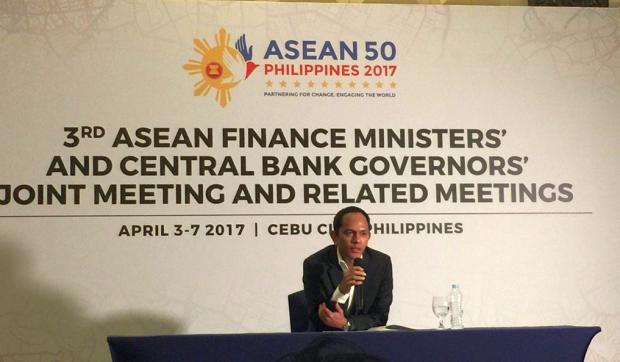Political noise could derail growth, warns Nomura economist

Euben Paracuelles, an economist, holds a news briefing on Friday, April 7, 2017, at the 3rd Asean Finance Ministers’ and Central Bank Governors’ Joint Meeting in Mactan. (Photo from PIA Region 7)
LAPU-LAPU CITY, Cebu — Political noise could derail the growth of the Philippines, but the Duterte administration’s aggressive infrastructure drive and proposed tax reforms could offset the risk
.
Euben Paracuelles, executive director and senior economist for Southeast Asian at Nomura Securities Co. Ltd., said emerging economies, such as the Philippines and Indonesia, should watch out for politics since it poses major risks.
“The Philippines, from a negative standpoint, has been getting a lot of headlines and the political noise associated with that is being… investors are paying attention to it,” he said in a briefing on Friday on the sidelines of the 3rd ASEAN Finance Ministers’ and Central Bank Governors’ Joint Meeting at Shangri-La’s Mactan Resort and Spa.
In Indonesia’s case, the April 19 gubernatorial election in Jakarta was also seen as a potential risk.
Should incumbent Gov. Basuki Tjahaja Purnama lose it could imply that President Joko Widodo’s political standing and support base are weakening. Purnama is a close ally of Widodo.
While these were the main risks he could see for both countries, he emphasized that these were still low at the moment.
Paracuelles said he would always argue that, in the Philippines, the political dynamics are distinct from economics.
On one hand, politics may have some impact on investor sentiment, but on the economic front, the administration is also ramping up infrastructure and undertaking various reforms in government.
“As long as they make progress on those things, that should remain very supportive of the overall economic outlook for the Philippines,” Paracuelles said.
Nomura expects the Philippine gross domestic product (GDP) to grow by 6.3 percent in 2017, slightly lower than the 6.8-percent growth in 2016 – yet still faster than the projected pace of its neighbors.
The same goes for Indonesia, whose government’s focus is also very clear and that is to invest in infrastructure and deregulate the economy.
Paracuelles said that, among the five major ASEAN economies, Nomura was most positive about Indonesia and the Philippines while it was cautious about more open economies such as Malaysia, Singapore, and Thailand.
Nomura sees a divergence in the economic outlook for these countries, but the disparity was seen to be less than what it initially anticipated at the end of the year due to the region’s improving export performance over the last quarter.
“It’s not just within ASEAN, but the broader Asia region,” Paracuelles said.“ Electronics exports have picked up very significantly.”
This was helping growth in export-oriented countries such as Malaysia, Thailand, and Singapore, while Indonesia and the Philippines still need to catch up.
Even though the export story in Asia was improving, the question remained on how long the region could sustain it, Paracuelles said.
He said it might gain momentum for a few months up until mid-year and then start to taper off toward the end of 2017.
As exports start to turn again, he said divergence will begin to widen.
Beyond that, the divergence can be seen in demographics and existing policy buffers in countries in the region.
The ASEAN region faces many external risks including US Fed interest rate hike, the strengthening of the US dollar, and the threat of capital outflows returning to the US from member-states.
Paracuelles said the key was to look at countries that have policies that can buffer these threats including high forex reserves and the ability to jack up interest rates domestically to harmonize with the Fed.
Among the five major ASEAN economies, Paracuelles said only the Philippines and Indonesia have room to do both.
He said they were optimistic the Philippines and Indonesia perform better in terms of growth beyond 2018.
Nomura currently projects Philippine economic growth at 6.5 percent by 2018.
Paracuelles added that they also see lower growth rates for Thailand, Malaysia, and Singapore compared to the rest of the region. /atm














